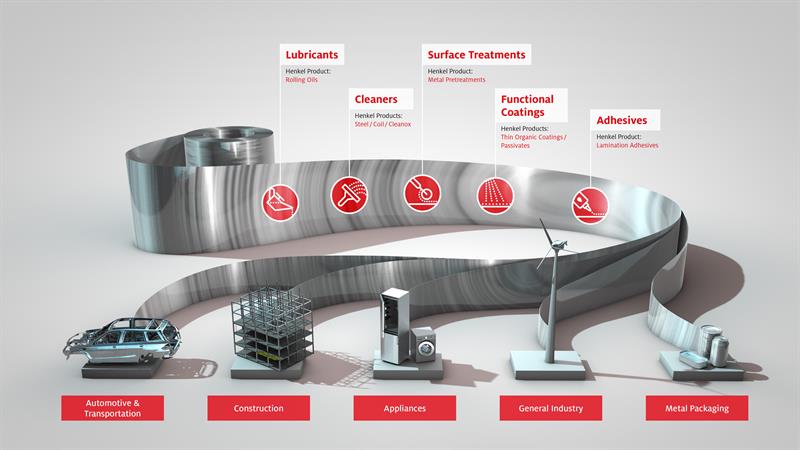Game-changing new technologies are driving the biggest transformation that the automotive sector has seen in 100 years. The car of the future will be electrified, connected to its environment, autonomously driven, and even shared among several users.
But what does this step-shift mean for manufacturers? Which adaptions will they have to make to production processes—while still delivering high performance, safety and efficiency?
The opportunities
For Dr Christian Kirsten, corporate senior VP of Automotive & Metals at Henkel, three changes will have profound opportunities for automotive material suppliers moving forward:
Lightweight construction: Lightweighting in the automotive industry has been a trend for many years. Manufacturers have been constantly looking for ways to take weight out of the car body and chassis. There are many methods to do so, including the increase of aluminium content.
The emergence of electric vehicles: As well as for cost efficiency and safety challenges, electric vehicles need to be able to achieve sufficient range. Manufacturers need to ensure that the battery is completely protected, maintaining its structural integrity in the case of a crash or a fire.
The continuous trend towards autonomous driving: The road to totally autonomous vehicles is a long one. The first step will be electrification, with smarter cars to follow. But this shift presents its own challenges, especially in ensuring the reliability and safety of all vehicles on the road.
Next steps
Optimising the design of these future vehicles will require a combination of engineering and material science expertise.
Henkel Adhesive Technology solutions include thermal interface materials, like gap filler technology, which will help batteries run safely at a consistent temperature. Other technical examples from the portfolio include adhesive technologies for bonding battery cells together, and UV light purification solutions that reduce cycle times and lower processing costs.
“Our portfolio includes thermal interface materials, adhesives, sealants and functional coatings for battery packs, and other specific components on the car,” says Frank Kerstan, director e-mobility & powertrain at Henkel. “We combine this material expertise together with engineering support to work with our customers on new designs in a very early phase, to ultimately allow them to achieve smarter and more cost-efficient designs for certain components.”
Coil pretreatment
As part of its active global support for the metal coil industry, Henkel is partnering with major coil producers to implement dedicated process solutions for end applications in e-mobility. In addition, the company is also addressing demands for reducing the complexity of downstream manufacturing steps by enabling continuous upstream functional coating processes without compromising the technical properties of the coated material.
E-mobility is a megatrend that requires new approaches to enable the production of electrical applications in increasingly larger volumes, as required to meet the expected growth of hybrid and fully electrical vehicles. Metal coil producers play an essential role in this market, supplying steel and aluminium coils to the manufacturers of batteries, transformers, converters, wound cores, shunt reactors and other key components for e-drive and electrified powertrain systems.

Henkel is determined to help its customers in this dynamic market segment to steer the future of e-mobility and gain a competitive edge with a complete portfolio of products and services for metal pretreatment and functional coating. Moreover, in underscoring its commitment to the metal industry beyond established downstream solutions, the company is also exploring advanced concepts together with major metal coil manufacturers, designed to bring the value-added benefits of its functional coating products to upstream processes.
“So far, most functional coatings are applied in secondary process steps at the battery or component manufacturers’ sites, increasing the manufacturing complexity of end products, which is a considerable time and cost factor particularly with high-volume applications,” explains Aziz Mabrouki, business director metal coil Europe for Henkel. “In close collaboration with major customers, we have developed an integrated coil pretreatment and functional coating technology that can be applied in a continuous upstream process and will not only maintain but even improve the performance properties of the coated metal. In other words, adding value right on the coil.”
Henkel’s process know-how extends across the entire value chain from the rolling oil for electrical steel to specific pickling inhibitors and cleaners to specialised new functional and conductive thin coatings, such as for covering the aluminium foil used in EV battery systems. Besides providing reliable corrosion protection for painted or unpainted substrates, these products have been custom-tailored to improve the overall performance of e-mobility applications by enhancing insulation and bonding properties, magnetic permeability and electrical conductivity. At the same time, they also address important sustainability goals, such as minimised product consumption and waste and the phase-out of hexavalent chromium (CR VI) in metal treatment.
Latest product innovations targeted at both upstream and downstream metal pretreatment and functional coating for end products in e-mobility include:
- Bonderite O-TO dedicated product range
- Bonderite M-CR 12 series
In addition to the company’s comprehensive product portfolio for the metal coil industry, Henkel also offers special equipment to ensure best manufacturing practices in many coil process steps.



